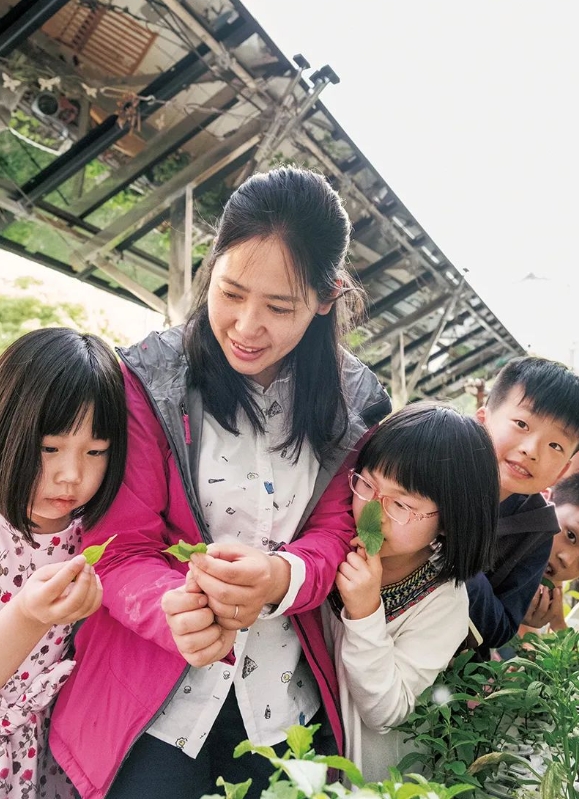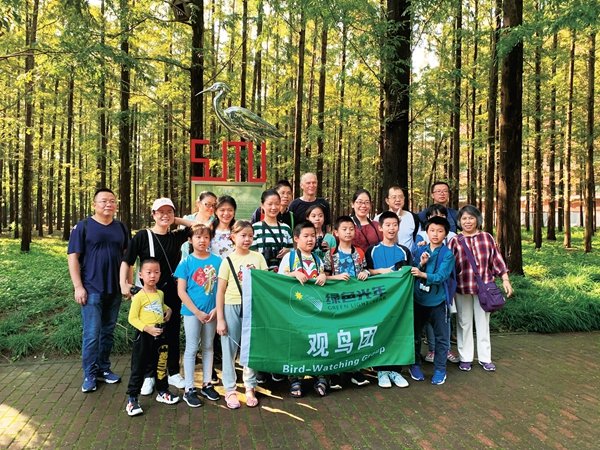Promoting Sustainable, Low-Carbon Development Among Children
 |
| [Photo by Xiao Muyi] |
Ni Huan, founder of Shanghai Green Light-Year Environmental Service Center, for years worked on projects related to low-carbon and green finance with various international organizations, including the United Nations Development Programme (UNDP) and the World Wide Fund for Nature. That was before 2012, when she settled in Shanghai. Two years later, Ni installed a solar power system on the balcony of her first-floor apartment. It was the first CIGS (thin-film photovoltaic technology) solarcell home power plant in China's mainland.
News that someone had installed a home-based, solar-power plant spread fast. The "magic" device attracted many children, both from within the community and from other communities in Shanghai, to visit Ni's apartment. Ni explained how the device worked, and she promoted the concepts of environmental protection and a low-carbon lifestyle to the children. She also helped the children learn about impacts of climate change.
During their visits, the children became fascinated with Ni's other environmentally friendly device — an outdoor aquaponics system that combined aquaculture with hydroponics, to keep fish and grow plants in one, integrated system. The fishes' waste provided an organic food source for the plants, and the plants naturally filtered the water for the fish. Ni also used organic fertilizer, made from kitchen garbage, and a dripping-irrigation system, for her plants.
The children, and their families, have become Ni's followers. More than 50 families, in the greater Shanghai area, have installed solar-power plants in their apartments since they visited Ni's balcony. The families have begun living low-carbon, environmentally friendly lifestyles.
The visitors' keen interest in environmental protection inspired Ni, in 2016, to establish Shanghai Green Light-Year Environmental Service Center, to better advocate sustainable lifestyles. The organization designed a tour route, which included Ni's home and nearby schools or organizations that had environmentally friendly equipment. Ni also trained more than 20 children, from her community, to be "little" volunteer explainers.
"When children explained the environmentally friendly devices to visitors, they helped promote the concept of sustainable development. Also, the seeds of sustainable, low-carbon development were planted in their minds. As years went by, the little volunteers grew up. Some of them have chosen majors related to the environment and sustainable development for their further studies," says Ni.
 |
| [Photo from Interviewee] |
The organization has held community-based activities, to promote low-carbon concepts among children and their families, and to help foster their interest in a low-carbon, environmentally friendly lifestyle. Now, the organization is playing a role as an educational institution for sustainable, low-carbon development.
During past years, Ni has led her colleagues in conducting project-based learning, themed with sustainable development, among primary and secondary school students. They have guided students, from schools in Shanghai and some cities in east China's Jiangsu Province, to conduct low-carbon and environmental-protection research projects. In 2017, they began organizing students, in Shanghai and Suzhou (a city in Jiangsu), to observe birds in their communities during weekends. The bird-observation activity lasted for nearly two years. Then, the students drew maps of bird-observation sites in their communities, and they completed research reports on the impacts of human activities on birds' reproduction.
In 2019, Ni invited six secondary school students, from various districts of Shanghai, to conduct a research project, themed "Where Does Shanghai's Sorted Garbage Go," in their communities. The students used GPS (Global Positioning System) locators to track the garbage. Participants learned recyclable waste was being transported to recycling sites, and the recyclables were being recovered. Most of the dry waste was being transported to an incineration plant. The research results were reported by Jiefang Daily, and the students used the media to call for continued efforts to sort garbage.
When extremely hot weather hit many areas of southern China in 2022, Ni invited more than 20 families, from six cities, to conduct online research, on green refrigeration, in their respective cities. Through the research project, she hoped more people would pay attention to the innovative ways disadvantaged people could resist the heatwave, and to learn how teenagers participated in energy conservation and emission reduction.
"I have guided students, in primary and secondary schools, and in universities, to conduct research projects, based on my work experience, involving low carbon, and on the current environmental problems in society. I hope to raise their interest in sustainable, low-carbon development, cultivate their abilities to solve relevant problems, and guide them in fulfilling their social responsibilities," Ni concludes.
(Women of China English Monthly June 2024)
Editor: Wang Shasha
Please understand that womenofchina.cn,a non-profit, information-communication website, cannot reach every writer before using articles and images. For copyright issues, please contact us by emailing: website@womenofchina.cn. The articles published and opinions expressed on this website represent the opinions of writers and are not necessarily shared by womenofchina.cn.








.jpg)

 WeChat
WeChat Weibo
Weibo 京公网安备 11010102004314号
京公网安备 11010102004314号